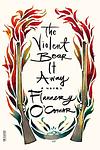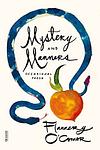Flannery O'Connor
Flannery O'Connor was an American novelist, short story writer, and essayist known for her sardonic Southern Gothic style and often grotesque characters. Born on March 25, 1925, in Savannah, Georgia, she is best remembered for her collections of short stories, 'A Good Man Is Hard to Find' and 'Everything That Rises Must Converge', as well as her novels 'Wise Blood' and 'The Violent Bear It Away'. Her work often addressed themes of morality and ethics, and she was a significant voice in American literature until her untimely death from lupus at the age of 39 on August 3, 1964.
Books
This list of books are ONLY the books that have been ranked on the lists that are aggregated on this site. This is not a comprehensive list of all books by this author.
-
1. The Complete Stories of Flannery O'Connor
This comprehensive collection of short stories showcases the author's exploration of the human condition, particularly in the American South. The stories, known for their dark humor, religious themes, and grotesque characters, delve into the complexities of morality, ethics, and the struggle between good and evil. The author's unique blend of Southern Gothic style and religious allegory creates a vivid portrait of a society grappling with its own contradictions and shortcomings.
-
2. A Good Man Is Hard to Find
This collection of short stories is set in the American South and explores themes of morality, ethics, and the complexity of human nature. The stories feature a variety of characters, each grappling with their own moral dilemmas and personal struggles. The title story centers around a family's disastrous road trip, during which they encounter a notorious escaped convict. Through these narratives, the book examines the concept of "goodness" and the capacity for redemption and grace in a flawed world.
-
3. Wise Blood
"Wise Blood" is a novel about a young man named Hazel Motes, who returns home to Tennessee after serving in World War II and finds his religious beliefs shaken. He becomes a street preacher, founding the Church Without Christ to preach his message of faithlessness. The book explores themes of redemption, faith, and the struggle between belief and atheism as Hazel interacts with a variety of eccentric characters and faces his own internal battles.
-
4. Everything That Rises Must Converge
"Everything That Rises Must Converge" is a collection of nine short stories that explore themes of racial tension, family dynamics, and morality in the mid-20th century American South. The stories delve into the psyche of various characters, most of whom are grappling with the changing social and racial landscape of the time. The narratives often reveal the characters' inherent prejudices and their struggle to reconcile their beliefs with the evolving world around them.
-
5. The Violent Bear It Away
The novel revolves around a young boy, Francis Tarwater, raised by his religious fanatic great-uncle in the backwoods of the American South. After his uncle's death, he is torn between following his uncle's wish for him to become a prophet, and the allure of a more conventional life presented by his educated uncle, Rayber. The story is a deep exploration of religious extremism, the struggle between free will and destiny, and the power of prophecy.
-
6. The Habit of Being
"The Habit of Being" is a collection of personal correspondence by a renowned southern writer, offering a profound insight into her private life, thoughts, and creative processes. These letters, written over a span of two decades, reveal her struggle with lupus, her strong Catholic faith, her sharp wit, and her dedication to writing. The book also provides a glimpse of her relationships with literary contemporaries and her insightful thoughts on contemporary issues, literature, and religion.
-
7. Mystery and Manners
"Mystery and Manners" is a collection of essays and lectures exploring the nature and purpose of literature, with a particular emphasis on fiction. The author provides a deep reflection on the craft of writing, the role of the author, and the relationship between literature and religion. The book offers valuable insights into the author's own approach to writing, while also discussing broader philosophical and aesthetic issues related to the art of storytelling.






